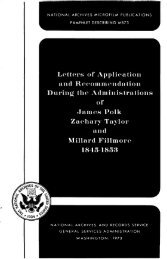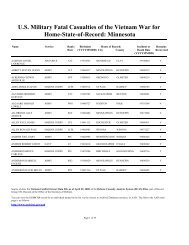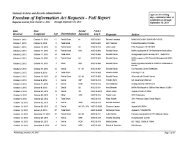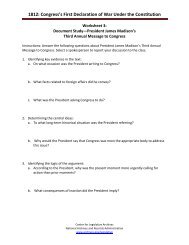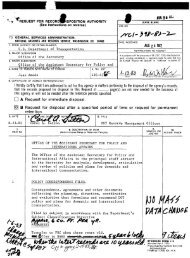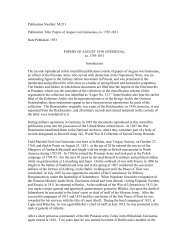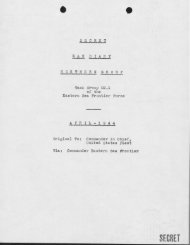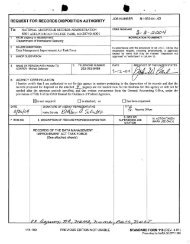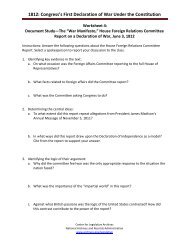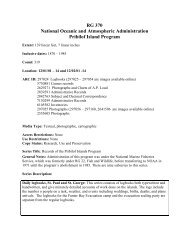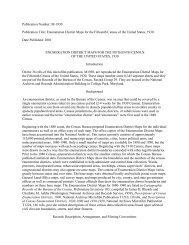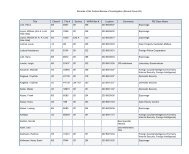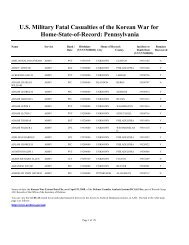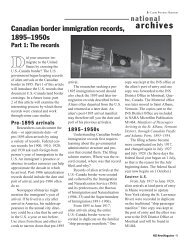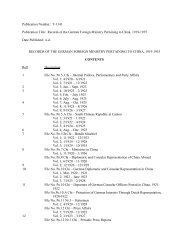HITLER'S SHADOW - National Archives and Records Administration
HITLER'S SHADOW - National Archives and Records Administration
HITLER'S SHADOW - National Archives and Records Administration
You also want an ePaper? Increase the reach of your titles
YUMPU automatically turns print PDFs into web optimized ePapers that Google loves.
depended partly on the individuals involved. Some former Gestapo officers were<br />
more willing to cooperate than others.<br />
In August 1949 CIC Headquarters requested organizational charts of the<br />
Gestapo in Baden (CIC Region II) in order to exploit former Gestapo Communist<br />
experts there. 29 In 1945 CIC had undertaken studies based on interrogations<br />
of arrested Gestapo members, but these studies were organizational in nature<br />
<strong>and</strong> were h<strong>and</strong>icapped by the fact that in many cities, Heidelberg for instance,<br />
Gestapo officers received orders to burn their records. 30 Regional CIC officers now<br />
reconstructed Gestapo personnel lists for the major cities including Mannheim,<br />
Heidelberg, <strong>and</strong> Karlsruhe. They included potential Communist experts from<br />
the Gestapo, together with up-to-date addresses <strong>and</strong> notes on Gestapo personnel<br />
who might have fled south to the French occupation zone.<br />
Some Gestapo personnel in northern Baden had already been sentenced for<br />
war crimes. Hermann Boschert of the Karlsruhe Gestapo was serving a life sentence<br />
(subsequently shortened) for his role in the murder of an escaped British POW even<br />
though, in the CIC’s assessment, he “may be termed an expert on communism.” 31<br />
Eugen Feucht of the Heidelberg Gestapo “was the most active man in the political<br />
field,” according to former Gestapo co-workers. In 1949 he was serving a three-year<br />
prison term for his wartime activities. Regardless, special agent Fred C. Hicks noted<br />
that “[I] will make an attempt to contact Feucht in the very near future.” 32<br />
Others refused to talk for fear of self-incrimination. “A burned child avoids<br />
fire,” said Hermann Kraut, the former head of the Baden Gestapo’s Referat<br />
N (which managed <strong>and</strong> registered informants), who worked in 1950 as a<br />
watchmaker, “<strong>and</strong> for that reason I won’t do any more political work.” Kraut told<br />
the CIC that he “had been contacted numerous times by an American civilian<br />
organization … but that he refused to work for that organization, regardless of<br />
how much they would pay him.” 33 Johann Oettinger had been in charge of the<br />
Gestapo in Heidelberg but claimed to have no contact with any of his office’s<br />
former informants. Special Agent Hicks wrote that, “Oettinger does not want to<br />
give any information to this office.” 34<br />
The efforts of Special Agent Ralph Kahn in Mannheim, well documented<br />
in the new records, suggest exp<strong>and</strong>ed use of former Gestapo personnel to<br />
penetrate the KPD. In 1949 Kahn contacted every former Gestapo officer of<br />
possible value in Mannheim. He had mixed success. Fritz Michel was, according<br />
New Materials on Former Gestapo Officers | 41



